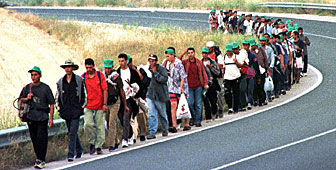Switzerland’s asylum policy is under pressure

Switzerland anxiously awaited the outcome of a European Union summit on tightening immigration controls in the Spanish town of Seville as it drew to a close on Saturday.
During the two-day summit EU leaders promised to come up with a common policy to curb illegal immigration.
They agreed to begin joint border patrols as part of a new series of measures to combat illegal immigration and a draft declaration said that the 15 member countries would set up a common asylum policy by 2003.
However, they held off on a proposal to penalise poorer nations, which do not stop their nationals from seeking illegal work in the EU, and which do not take back illegal immigrants.
The decision was made despite the fact that the number of people seeking asylum in EU states has dropped dramatically over the past ten years from 675,000 to 384,000.
In Switzerland numbers have risen over the last two years and are back up to the high levels of the 1990s when there was conflict in the former Yugoslavia. In this period, Switzerland took in more refugees per head of population than any other country in Europe, apart from the Netherlands.
In 2001, around 21,000 people requested asylum in Switzerland – 3,000 more than the year before. Up to 300,000 illegal immigrants are believed to be in the country.
Swiss impact
Any final decisions taken at the Seville summit will have a direct impact on Switzerland since the country is surrounded by EU states.
Next month, Switzerland begins discussions with the EU on a second set of bilateral treaties, including conditions for Switzerland’s entry to the Schengen agreement on eliminating border controls between signatory states and the Dublin accord on asylum.
“It doesn’t matter if we enter the Schengen agreement or not; however the EU decides to protect its outer borders will have an impact on Switzerland,” Monique Jametti of the Swiss Justice Ministry told swissinfo.
The Federal Refugee Office is also watching the Seville summit closely. “Other European countries will be affected if EU states tighten their asylum laws,” said spokeswoman Brigitta Hauser. “No matter what happens, the number of people seeking asylum [in Europe] will not decrease.”
Follow EU course
In the past, Switzerland has usually followed Europe’s lead on immigration policy. The conservative parties represented in the Swiss government have already indicated that they would like to follow suit, and are using the opportunity to prey on fears that a more restrictive policy in the EU will lead to an increase in the number of asylum seekers in Switzerland.
The right wing Swiss People’s Party says the number of border guards should be increased and they should be backed by professional army units.
The party has launched an initiative that will go to a nationwide vote this autumn, aimed at stopping what it calls “the abuse of the right to asylum”.
The centre-right Radical Party says Switzerland needs to be made less attractive to foreigners. The centre-right Christian Democratic Party is not as harsh, but says Switzerland cannot follow a different course to the EU.
The centre-left Social Democratic Party stands alone in the Swiss government by opposing the introduction of tighter laws.
swissinfo

In compliance with the JTI standards
More: SWI swissinfo.ch certified by the Journalism Trust Initiative









You can find an overview of ongoing debates with our journalists here . Please join us!
If you want to start a conversation about a topic raised in this article or want to report factual errors, email us at english@swissinfo.ch.